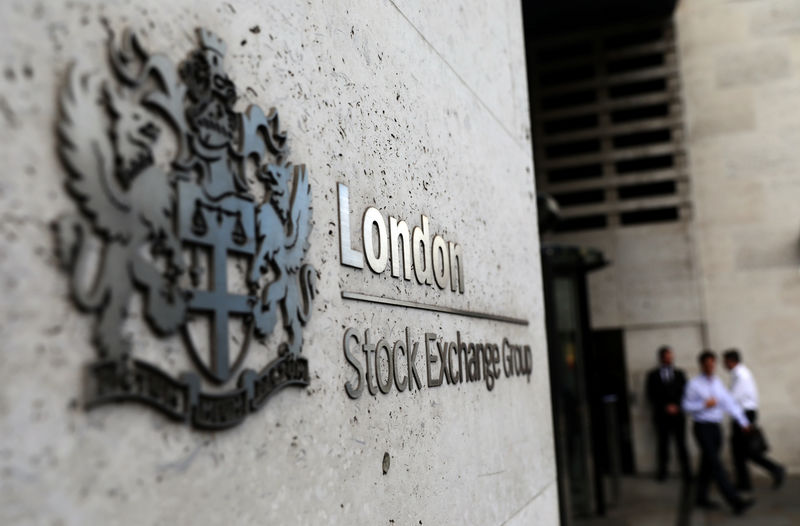By Helen Reid and Muvija M
LONDON (Reuters) - Weak economic data from China sent Britain's top stock index down on Friday as miners, consumer stocks and banks suffered from investors' mounting anxiety about the world's second-biggest economy.
The FTSE 100 (FTSE) ended the day down 0.7 percent, while the FTSE 250 (FTMC) fell 0.9 percent. The leading stocks index still managed a gain for the week, which saw Prime Minister May win a vote of no confidence on Wednesday.
May's attempt to renegotiate her deal with the European Union did little to dispel investor concerns over Brexit, though, sending sterling down 0.8 percent on Friday.
Banks and miners were the biggest drag as the weak data added to persisting fears over slowing growth in China, amid its trade dispute with the United States.
China's November retail sales grew at the weakest pace since 2003 and industrial output rose at the slowest rate in nearly three years as domestic demand softened further.
Mining stocks dropped as London copper was on course for a third straight weekly loss.
Glencore (L:GLEN) dropped 1.7 percent while Rio Tinto (L:RIO), BHP (L:BHPB), and Anglo American (L:AAL) fell between 0.6 and 1.5 percent.
Overall global earnings estimates for next year have begun to fall as analysts adjust to a slower pace of global growth with weak economic data piling up from Europe and China.
"Volatility and the number of sharp moves across assets appear to be rising and investors are facing a challenging macro backdrop," wrote Goldman Sachs (NYSE:GS) strategists.
Investors pulled a record amount from global equity funds this week, data from EPFR showed on Friday. UK equity funds were also set for a record year of outflows with $9.8 billion flooding out so far in 2018.
Helping the FTSE 100 come back from its earlier sharp losses were energy stocks and Astrazeneca (L:AZN) which gained after SunTrust gave it a "buy" rating.
But the FTSE 100, along with euro zone stocks (STOXXE) and the pan-European index (STOXX), was on track for its worst quarter since 2011 when Europe was in the throes of a sovereign debt crisis.
Housebuilders Taylor Wimpey (L:TW), Persimmon (L:PSN), and Barratt Development (L:BDEV) fell 1.8 to 2.7 percent as doubts persisted over Prime Minister May's ability to secure tweaks to her Brexit deal from EU leaders.
A pessimistic note from Canaccord Genuity analysts didn't help the mood.
"Value potential is extremely attractive but macro risks are exceptionally high," the analysts wrote.
In single-stock moves, GVC (L:GVC) shares jumped 8.8 percent ahead of next week's parliamentary vote on maximum stakes on fixed-odds betting terminals.
Citi analysts said the vote would be a "significant positive catalyst" for the stock, eliminating the possibility the company would have to pay out around 676 million pounds to shareholders.
GVC agreed to pay, as part of its acquisition of Ladbrokes (LON:LCL) Coral in March this year, a contingent value right (CVR) linked to the legislation, and worth 35p per Ladbrokes Coral share if the legislation is not enacted by 28 March 2019.
In results, construction firm Balfour Beatty (L:BALF) climbed 4.1 percent after saying full-year profits would beat expectations thanks to the proceeds from the sale of an infrastructure investment this month.
Construction materials firm Low & Bonar (L:LWB), however, saw its shares fall 16.8 percent, the biggest drop on the FTSE small-caps index (FTSC), after it said tough market and trading conditions persisted during its fourth quarter.
Drugmaker Indivior (L:INDV) topped the FTSE 250, up 8.3 percent, after BAML upped its price target on the stock.
The company, embroiled in a lengthy legal battle with India’s Dr. Reddy’s over a copycat version of its opioid addiction drug, has seen its shares sink 77.4 percent this year.
Small-cap recruiting firm Sthree (L:STHR) climbed 3.8 percent after it raised its forecast for annual profits thanks to stronger international demand.

Peer Robert Walters (L:RWA) also jumped 7.9 percent.